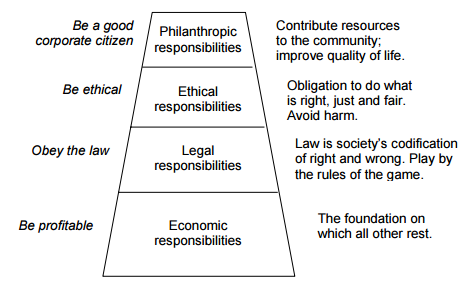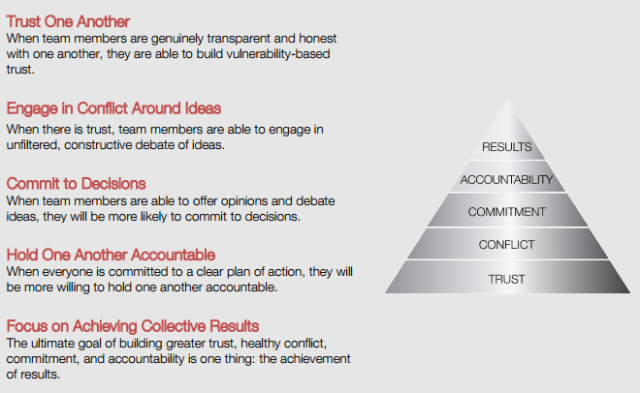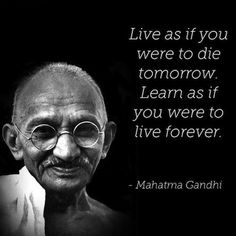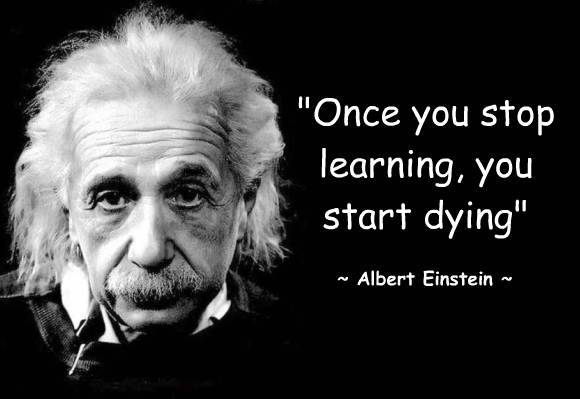Question 5
The writer has identified two visions of leadership. One of the visions is to be an ethical business leader. Ethical business responsibility is one of the elements in Carroll model of corporate social responsibility that illustrated in Figure 5.1. Ethical practices in business are essential to make sure that the company operations and its business flow are in the right path (Yukl 2002; Visser 2006). In order to be ethical person, self discipline and rationale are needed. Deontological and teleological view of ethics can be used as ethical guides in carry out daily business. Working ethically also helps to build others as disciplined business professionals.
Figure 5.1 – The Carroll Model of Corporate Social Responsibility (Visser 2006, p34)
Besides, the writer also aims to work effectively as a team with the reference of the cohesive team model shown in figure 5.2. Cohesive team can be achieved with five elements of behaviour, which consists of conflict, trust, commitment, accountability, and results (Petersen 2014; Bruhn 2009). Work as a team requires both soft and hard skills (Yukl 2002). Effective communication and cultural understanding also are the skills that the writer aims for in building effective leadership, especially working as a team in the diverse teams. Working as a team also encouraging information sharing and innovates creativity, which are indeed helpful to the writer’s soft skills building in the workplace (Manser 2002).
Figure 5.2 – The Team Cohesiveness Model (Petersen 2014, p3)
Richard Branson, the founder of Virgin Group, inspired the writer’s understanding of effective leadership. This is because he treasures his employees and acts them as his assets in running the business. Besides, he also demonstrated motivation and inspiration to the employees to keep them energized and love their work. As a manager and leader of Virgin group at the same time, he adapts changes in the business to make the Virgin group compete effectively with other rivals (Vries & Vitry 1996; Fulmer & Ployhart 2013).
Another leadership example that inspired the writer’s understanding of effective leadership is Tony Fernandes. He demonstrated the leadership examples by getting close with his staffs and precious his staffs as part of the important assets in running airline business. He put his staffs in first priority and customers in second as he believes that happy staffs produce happy customers. Besides, he also show business ethics in making sure the airline safety as the paramount priority in running airline business to make sure both of the customers and his staffs are safe throughout the journey (Ricart 2005).
The writer received valuable feedback on his skill strengths from colleagues through the class activities and conversations. The writer has been suggested to build better interpersonal and intrapersonal skills such as communication, decision making, self reflection, and confidence skills. This is because the writer is lack of effective communications skills and confidence in expressing views in English. Besides, the writer also received feedback from colleagues to further improve personal strengths identified during leadership KPI activity such as treat people with respect and cooperative relationships development in order to develop as a leader in aviation industry. Aviation industry is the industry that the writer interested to work in future. The writer also been suggested to build clear goals and visions of the team in carry out tasks to avoid vague team direction. Giving accreditations to team members also one of the feedbacks the writer received to value the others work and contributions. These skills are important to be practiced in order to be effective leader in aviation industry.
The writer also received feedback from both the colleagues the lecturer during the Lego tower building activity where the writer was allocated to work in diverse team. The lecturer gave feedback to the writer that he should build better communication skills in leading people from different backgrounds. Through the Lego tower building activity, the writer learnt that working in diverse team can promotes innovation and creativity as there are different perspectives from people with different backgrounds. Thus, decision making in diverse team is better as there are more views and perspectives presented. The writer also learnt that active listening and instructing skills are essential to promote effective teamworking during the draw and guess activity in class, which are also important to lead in aviation industry. This activity has aroused me that instructing skills is not always easy as there are different thinking perspectives raised in between the people with different backgrounds.
Through the MBA program, the writer aims to develop several leadership skills. One of the leadership skills is good interpersonal skills. Throughout the module, the writer learnt on how to work effectively as a team. Interpersonal skills are crucial to have effective communication between other people and to work in team. The writer aims to improve interpersonal skills like good verbal and non-verbal communication, listening, negotiation, decision making, problem solving, responsibility, and others throughout the MBA program. These skills are playing important roles in leading people and guiding people to work as a team. The skills also promote motivation and inspiration between team members (Duus & Cooray 2014).
Besides, the writer also aims to develop better intrapersonal skills such as building confidence, business ethics, and self evaluation that could help in working and leading in a team in future workplace. The writer aims to reflect himself always in order to improve personal and communication skills. Additionally, the writer also target to develop good business ethics practices as he understands the importance of good business ethics to a company operation. Good business ethics also promotes good working culture in an organisation (Duus & Cooray 2014; Wheaton College 2012).
(805 words excluding figures and tables)
References
Bruhn, J., 2009. The Group Effect. The Group Effect, p.171. Available at: http://link.springer.com/10.1007/978-1-4419-0364-8.
Duus, R. & Cooray, M., 2014. Together We Innovate : Cross-Cultural Teamwork Through Virtual Platforms. Available at: http://jmd.sagepub.com/content/36/3/244.full.pdf+html?hwshib2=authn%3A1427348552%3A20150324%253A5d74a7a5-3f0e-4000-b7a6-2a211d46849b%3A0%3A0%3A0%3AVsrymLLN%2B6LZT%2BgCxwSCow%3D%3D.
Fulmer, I.S. & Ployhart, R.E., 2013. “Our Most Important Asset”: A Multidisciplinary/Multilevel Review of Human Capital Valuation for Research and Practice, Available at: http://jom.sagepub.com/cgi/doi/10.1177/0149206313511271.
Manser, T., 2002. Teamwork and collaboration. Journal of Perianesthesia Nursing, 17, pp.344–345.
Petersen, K., 2014. The Five Behaviours of A Cohesive Team. Available at: http://www.fivebehaviors.com/UserFiles/The Five Behaviors Sample Profile.pdf.
Ricart, J.E., 2005. Now Everyone Can Fly: Air Asia. Asian Journal of Management Cases, 2(2), pp.231–255.
Visser, W., 2006. Revisiting Carroll’s CSR pyramid. Corporate citizenship in developing countries, pp.29–56. Available at: http://www.waynevisser.com/wp-content/uploads/2012/07/article_africa_pyramid_wvisser.pdf.
Vries, M.K.D.E. & Vitry, R. De, 1996. Leaders Who Make a Difference. European Management Journal, I(5), pp.486–493.
Wheaton College, 2012. Leadership & Teambuilding. Available at: http://wheatoncollege.edu/sail/leadership/student-involvement-handbook/strengthening-group/leadership-teambuilding/ [Accessed February 2, 2015].
Yukl, G. a, 2002. Leadership in organizations. , p.528. Available at: http://books.google.com/books?hl=en&lr=&id=50zHZAaV_iQC&oi=fnd&pg=PP2&dq=Leadership+in+Organization&ots=2zaHcrisyU&sig=GqHrr6G9regHWGuwtt4stjm6DaA\nhttp://files.liderancaecoaching.webnode.com/200000015-31f5732fb3/media-F7B-97-randd-leaders-business-yukl.p.






Hi Vincent,
Can you please highlight the places where amendments have been made? This is so that I can review your amendments more easily, otherwise I might miss areas where you have amended, thanks.
Best Regards,
Dr Anne Ho
Senior Lecturer
SGSCE
LikeLiked by 1 person
Hi Dr Anne, I have had made some amendments in terms of grammar mistakes, justifications in particular skills improvements given by colleagues and lecturer, and also the lesson reflections in class activity such as Lego tower building and draw and guess (also known as “Quick Draw”) activity. Besides, some referencing format are also been revised to ensure that the CU Harvard referencing format is well followed. Thank you.
LikeLiked by 1 person
Hi Vincent,
Good day. I have gone through your blog and i agree with your vision of leadership. Nowadays, ethical leadership is indeed important and crucial to keep the business environment in order. Apart from gaining profits alone, i feel that organisations have to be socially responsible as well. The Carroll Model of Corporate Social Responsibility is a good model for leaders. Richard Branson and Tony Fernandes are successful leaders that we should set as a role model.
Regards,
Gan Chin Ban
LikeLike
Hi Chin Ban. Indeed business ethics is of great concern in business as it can affect the organisation culture and we have to play ethical part in running business. Besides, there are other leadership skills that I aimed to learn in future to improve myself from time to time.
LikeLiked by 1 person
Hi Vincent, based on the Team Cohesiveness Model as illustrated, Is that necessary the stage of the team formation always happen in sequence? What if some of the team members do not compromise?
LikeLike
Hi Kary. It is not necessary the stage of the team formation always happen in sequence and is vary based on the contribution, acceptance, and cooperation level of the team. For instance, a team might undergo less stages of team formation if there is good cooperation and understanding between the team members. For the teams that are having team members that do not show good compromise to the team, it will result to the team have to follow every stage of team formation and the team will be having long period on the stages especially during the conflict and commitment stage.
LikeLike
Hi, you mentioned that you need improvement on your communications skills as well as built confidence. How do you plan to achieve this?
LikeLike
Hi Chin Yee. Well, I planned to improve my English pronunciation skills and do wide reading on English language in order to minimize the grammatical and vocabulary errors in communicating with others. Besides, I aim to produce better confidence skills by believe myself more on the decision that I had made and to act accordingly based on my decision.
LikeLike